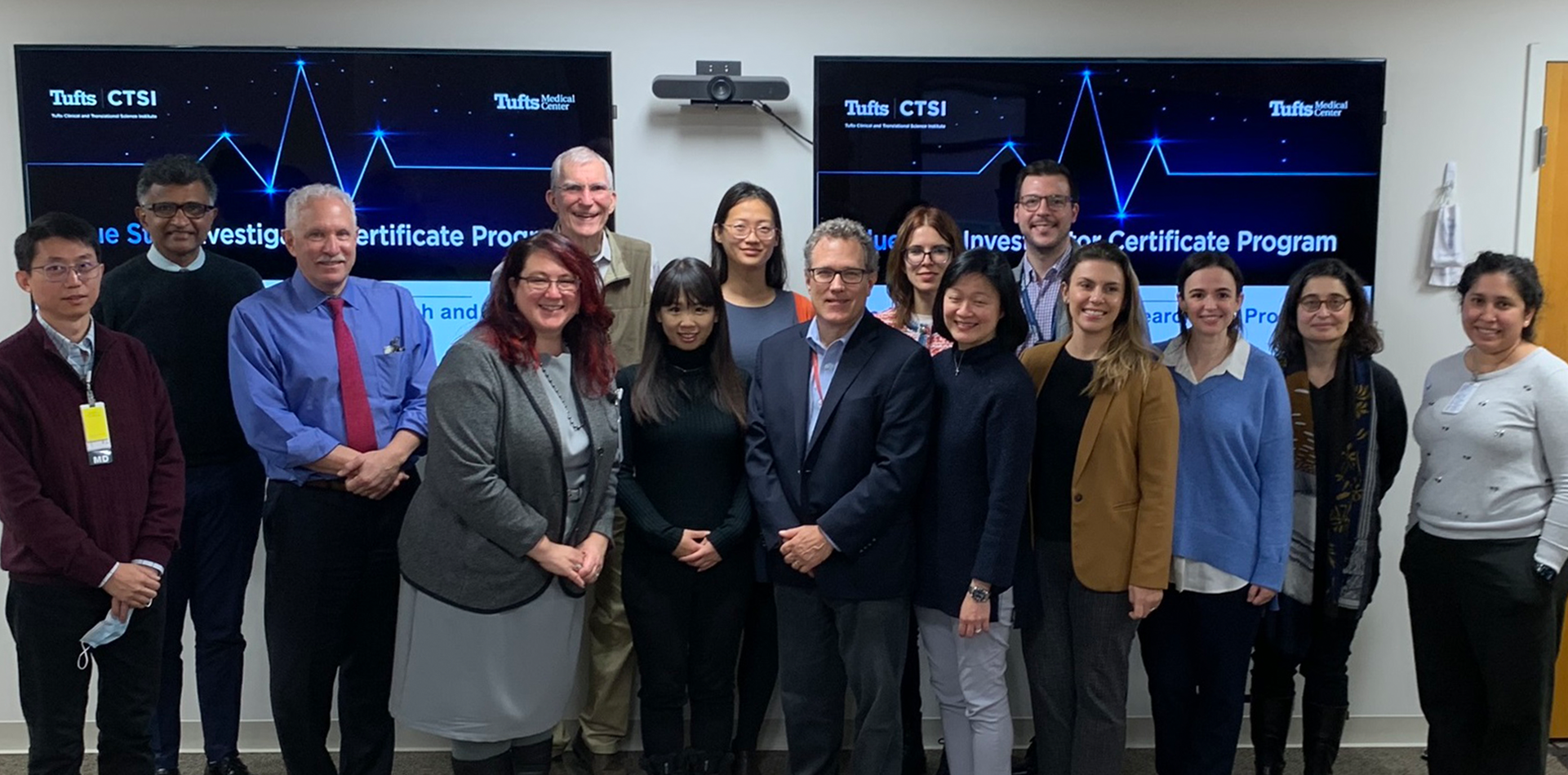
Overview
The Tufts University Graduate School of Biomedical Sciences (GSBS) Clinical and Translational Science (CTS) Graduate Program is delighted to offer an accredited Certificate Program in Health Economics and Outcomes Research (HEOR). The certificate program is co-directed by David Kent, MD, CM, MSc, Director of the CTS Graduate Program, and Peter Neumann, ScD, Director of the Center for Evaluation of Value and Risk (CEVR).
Individuals seeking an introduction to HEOR, including professionals in the pharmaceutical and biotechnology industry, clinicians and other health care professionals, graduate degree holders, and graduate degree students, are encouraged to apply.
The Program is designed to accommodate the schedules of learners who are already immersed in professional careers or other training programs. The total cost is $8,465, and it includes the following three courses:
- Introduction to Health Economics and Outcomes Research (2 credits)- Chambers
- Health Technology Assessment (HTA) (2 credits)- Cohen and Ollendorf
- Real World Evidence (1 Credit)- Kent and Paulus
What is HEOR?
The field of health economics and outcomes research (HEOR) has become increasingly important. Providing affordable health care while maintaining the best possible health outcomes is a challenge to all governments and health care payers. This is especially true in the United States, which spends almost twice as much per capita compared to other high income countries, yet has substantially poorer health outcomes. Major drivers of the spending gap include higher administrative costs and the higher prices of devices and pharmaceuticals in the US.
As health care becomes more complex, health care decisions can be improved by combining information from economic analyses (health economics) and vital clinical data on patients (outcomes research) to evaluate health care value. HEOR informs health care decision-making by allowing stakeholders, especially payers, health care providers, and patients, to understand the clinical, economic, and quality of life endpoints of various treatments and health care practices.
Why choose Tufts?
The Tufts University HEOR Certificate is the only program of its kind available in the Greater Boston area. In addition, Tufts is the home of the internationally renowned Center for the Evaluation of Value and Risk in Health (CEVR), led by Director Peter Neumann, ScD and Deputy Director Joshua Cohen, PhD, and including Faculty Member Daniel A. Ollendorf, PhD. CEVR:
- Brings experience in economics and decision analysis to a host of clinical and public health policy issues.
- Leads projects that encompass formal cost-effectiveness analysis and related techniques, as well as policy research and analysis pertaining to resource allocation.
- Is the home of three unique databases that measure and communicate the clinical and economic value of health care strategies: the Cost Effectiveness Analysis (CEA) Registry, the Global Health Cost Effectiveness Analysis (GH CEA) Registry, and the Specialty Drug Evidence and Coverage (SPEC) Database.
- In addition to core faculty (listed below), guest faculty will include HEOR thought leaders, including Sean Tunis, MD and William Crown, PhD.
Tufts is also the home of the Center for the Study of Drug Development (Tufts CSDD), an independent, academic, non-profit research center that provides data-driven analysis and strategic insight to help drug developers, regulators, and policy makers improve the efficiency and productivity of pharmaceutical R&D.
The Tufts HEOR faculty (see below) include experts in clinical investigation, clinical epidemiology, health services research, outcomes research, meta-analysis, biostatistics, drug development, and many related fields drawn from the Tufts University and the Tufts Medical Center communities, including the Institute for Clinical Research and Health Policy Studies (ICRHPS) and CEVR. This highly productive and committed faculty make the HEOR Program an excellent environment for deep and broad training in clinical research. The program will also feature guest lectures from internationally recognized leaders in HEOR, including chief executives, policy makers, and leaders of federal regulatory agencies.
Who is eligible?
Applicants for the HEOR Certificate Program should hold at least a bachelor’s degree. Professionals in the pharmaceutical and biotechnology industry (including departments such as HEOR, market access, commercial, and development), clinicians and other health care professionals, graduate degree holders, and graduate degree students are encouraged to apply.
Benefits
- Flexible online format is perfect for local or global participation.
- Students will experience live webinars, active discussion boards, and asynchronous lectures.
- Program faculty are experts in clinical investigation, clinical epidemiology, health services research, outcomes research, meta-analysis, biostatistics, drug development, and related fields.
- No thesis required.
Courses & Faculty
The HEOR Certificate Program will provide students with a basic introduction to HEOR consisting of three courses. These credits are not transferable to a degree program. The first semester will feature Introduction to HEOR. Real World Evidence and Health Technology Assessment are offered in the second semester.
Introduction to Health Economics and Outcomes Research (2 credits)
James D. Chambers, PhD, Course Director
This course introduces the fundamentals of Health Economics and Outcomes Research (HEOR). We begin with an overview of the issues addressed by HEOR – including the measurement of health benefits in terms that can be compared across disease domains, and the inclusion of cost impacts across time and over multiple societal sectors that extend beyond health care itself. The course focuses on recommendations issued by the Second Panel on Cost Effectiveness in Health and Medicine for the US, and highlights key differences with guidance issued by authorities in other countries. Finally, through a series of case studies, the course introduces students to important sources of data for the HEOR field.
Real World Evidence (1 credit)
David M. Kent, MD, CM, MSc, Course Director
William Crown, PhD, Course Director
This is an introduction to topics in the use of real world evidence (RWE) to inform health care decision making. While randomized controlled trials remain the gold standard for establishing treatment efficacy, RWE offers many advantages including the availability of timely data at reasonable cost, large sample sizes that enable analysis of subgroups and rare outcomes, and increased generalizability to real-world clinical practice and more representative patients.
Enthusiasm for RWE is tempered by concerns including those related to misclassification or data quality, the lack of randomization and other biases, and spurious data- driven findings. This course will introduce the foundational study designs and analytic approaches that are integral to the valid and efficient analysis of RWE, including those relevant to “big data.”
RWE frameworks and approaches to be discussed will include limiting bias in observational big data, harnessing RWE for predictive analytics, identification of heterogeneity of treatment effects, pragmatic trial designs and the role of RWE for various stakeholders, including regulators. The potential role of RWE for the regulatory approval of novel therapies will also be discussed. Topics will be illustrated through the use of contemporary case studies representing both the promise and limitations of using RWE to inform health care decision-making.
Health Technology Assessment (HTA): Philosophy, Approach, and Challenges Research (2 credits)
Joshua T. Cohen, PhD, Course Director
Daniel A. Ollendorf, PhD, Course Director
Read the syllabus here!
This course describes the practice of health technology assessment, as conducted by major agencies and other organizations in the US and elsewhere, and introduces the technical tools used to project health benefits and costs. For the US, the course reviews guidelines promulgated by the Second Panel on Cost Effectiveness Analysis in Health, and value assessment frameworks developed in the US with a focus on the Institute for Clinical and Economic Review (ICER). The review of HTA in other countries focuses on the National Institute for Health and Care Excellence (NICE) and also reviews approaches used by agencies in other countries. Finally, the course introduces the use of computer simulation to estimate value when empirical data alone will not suffice.
Guest Lecturers
Courses will feature frequent expert guests lecturers, including:
- Marc Berger, MD, Consultant
- Jon Campbell, MS, PhD, Chief Science Officer, National Pharmaceutical Council
- Sean Tunis, MD, MSc, Senior Fellow, Center for the Evaluation of Value and Risk in Health (CEVR), Tufts Medical Center; Mentor-in-Residence, Johns Hopkins Tech Ventures
- Shirley Wang, PhD, Associate Professor of Medicine, Brigham and Women’s Hospital
Online Learning Environment
Zoom will be used in conjunction with the Tufts University learning management system Canvas, which allows students to access all course material at any time from any location with an internet connection. Videos, reading assignments, discussion questions, and assessments will be posted to a designated course site on Canvas for students and faculty to collaborate in an online learning environment, and webinars will be streamed online via Zoom. The Certificate program is designed to also include a face-to-face symposium at the end of the second semester, with the presentation of culminating projects and opportunities for networking with fellow students and program faculty. The format of this event will be determined in the future depending on the status of the COVID-19 pandemic.
Frequently Asked Questions (FAQ)
HEOR Program Frequently Asked Questions (PDF)
To Apply
Start your online application. Applications to begin the Program in the Fall semester are due by August 15.
Applicants will be required to have a minimum of a bachelor’s degree. Applications will require transcripts, one letter of recommendation, a CV, a personal statement, and demonstrated English language proficiency (IELTS 6.5, TOEFL 80).
Have questions? Contact Elizabeth Leary, PhD, Senior Program Manager.



